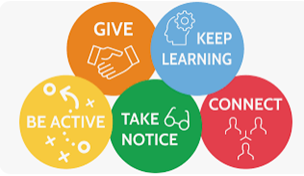
At Dothill Primary School, we aim to promote positive mental health and wellbeing for our whole school community, this includes children, staff, parents, and carers. We recognise how important mental health and emotional wellbeing is to our lives in just the same way as physical health. We recognise that children’s mental health is a crucial factor in their overall wellbeing and can affect their learning and achievement. All children go through ups and downs during their school career and some face significant life events, we endeavour to work closely with our families to support our children and offer the correct level of support and signposting where possible.
Two key elements to support good mental health are:
- Feeling Good – experiencing positive emotions like happiness, contentment and enjoyment. Including feelings like curiosity, engagement and safety.
- Functioning Well – how a person is able to function in the world, this includes positive relationships and social connections, as well as feeling in control of your life and having a sense of purpose.
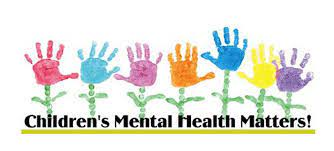
As a school we value the importance of talking to our children regularly about mental health and wellbeing and have two members of staff that lead on this within school.
Our Deputy Head Teacher, Nikki Harvey, is our Senior Mental Health Lead and has a Level 4 Certificate in Mental Health Aware Leadership (Education). Our Learning Mentor, Karen Sturmey, is a Mental Health First Aider, Qualified ELSA and a Drawing and Talking Therapist.


Mrs Nikki Harvey

Mrs Karen Sturmey
Our mental health leads attend regular CPD, including a termly full days training through Future in Minds. This offers external training and a network of working with other professionals to allow staff to know the latest data, different approaches to supporting children, awareness of local and national picture and organisations that can support both school and families. The deputy head teacher and learning mentors have regular meeting to discuss individual children of concern and planning interventions to support.
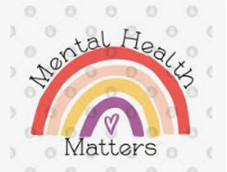
Levels of Support within School
- Universal Support– To meet the needs of all our pupils through our overall ethos, school values and our wider curriculum. For instance, developing resilience for all.
- Additional support– For those who may have short term needs and those who may have been made vulnerable by life experiences such as separation or bereavement.
- Targeted support– For pupils who need more differentiated support and resources or specific targeted interventions such referral to wider professionals.
Supporting children’ positive mental heath
We believe the school has a key role in promoting children positive mental health and helping to prevent mental health problems. Our School has developed a range of strategies and approaches including:
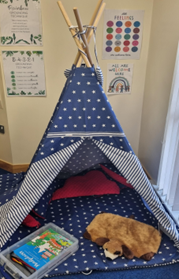
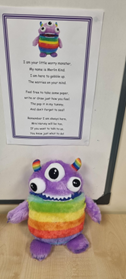
Pupil-led activities
- Campaigns to raise awareness of mental health.
- Peer mediation and Peer mentoring – children working together to solve problems and planned sessions where identified adults mentor a designated child
- Friendship bench – at lunch time all children are encouraged to support those that are sat on the friendship bench
- Transition throughout school to ensure all important details are shared about individual children
- Transition Programme to secondary schools which includes all Year 6 children having a staff mentor to support a smooth transition to secondary school
- School Parliament and Safeguarding Squad to ensure pupils have a voice across school
- Open door policy where pupils are encouraged to share a worry or concern with any adult within school that they feel safe and comfortable in talking to
Class activities
- Praise mechanisms where children can be praised for certain duties, tasks or things they have done and have them celebrated in class
- Worry monsters /cushions - a mechanism where children can anonymously share worries or concerns in class
- Class ‘wellbeing check-ins’ where children can identify if they need to talk to a member of staff
- Mental health teaching programmes e.g. based on cognitive behavioural therapy
- Circle times/ class discussion to address key issues and concerns to support children with what is happening in school and within the community
- PSHE curriculum to supports developing the whole child
Whole school
- Wellbeing week – whole school focus on doing things which make us feel good
- Wellbeing walks
- Weekly Mental Health and Wellbeing assemblies
- Displays and information around the school about positive mental health and where to go for help and support
- Wellbeing area in each classroom developed to support the emotional health and wellbeing of a child. They offer children a safe place to access when they need a few minutes to regulate or time away from others
Small group activities
- Nurture classroom
- Wellbeing support groups
- Resilience Training
- Drawing and Talking
- ELSA
- Bereavement Support Groups
- Autism in girls group for year 6 in preparation for secondary school
If you would like to find out more information then please refer to our Mental Health and Wellbeing policy.
Support for Families – useful links
Useful links
Dealing with anxiety - https://tutorful.co.uk/guides/the-expert-guide-to-help-your-child-with-anxiety
Young minds parents’ survival guide - https://youngminds.org.uk/find-help/for-parents/parents-survival-guide/
Anna Freud National Centre for Children and Families
- https://www.annafreud.org/parents/
https://www.familylives.org.uk/how-we-can-help/confidential-helpline/
https://youngminds.org.uk/resources/school-resources/find-your-feet-transition-tips-for-parents/
https://www.parentsprotect.co.uk/if-a-child-tells-you-about-abuse.htm
https://www.nhs.uk/live-well/alcohol-support/
http://www.anorexiabulimiacare.org.uk/family-and-friends/parents
https://www.autismhelp.info/primary-years
https://booksbeyondwords.co.uk/
